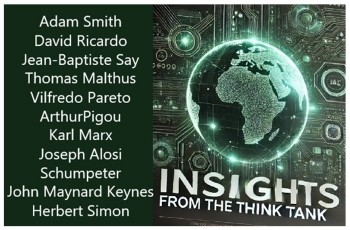シンクタンクからの眼 2022年12月12日
経済学は時代遅れの理論なのか?Is Economics an Outdated Discipline?

経済学は時代遅れの理論なのか?
経済とは生活を営む人々の基本的な経済的欲求から発生する現在進行形のダイナミックな社会現象である。そのため、過去の経済統計に基づく定理や理論をそのまま現在に適用することはしばしば無理が生じる。過去の古典的な経済理論は多くの学びを与えるが、それに固執することで、現代や未来の問題に適切に対応することは困難であろう。
経済学が目指すべきは、時代ごとに異なる新たな現象や人々の集団心理による行動から生じるマクロ経済の変化に対して、鋭敏な分析を行い、冒険的かつ実践的な処方箋を複数提示することである。すなわち、経済学における政策や評価は、理論よりも実際の臨床的な観察や応用を優先する必要がある。しかし、これを忘れ、他の自然科学のように「理論」に偏重することは、経済学本来の目的を見失うことにつながる。
経済学理論の教訓とその限界
私を含む経済学分野の多くの人は、アダム・スミスからは自由市場の基本を学び、マルクスからは資本家の搾取構造とその先にある社会主義への進化の必然性に関して学んだ。さらに、ケインズから不況時の公共投資の重要性を教えてもらい、フリードマンからは金融政策が全ての問題を解決する可能性を示したと聞かされた。確かに、これらの理論はそれぞれの時代において有効であり、経済学の理論的進化にも寄与してきた。
しかし、いずれの理論も現代経済の複雑さを十分に説明し、解決するには不十分である。特に、フリードマンの金融政策至上主義を信奉するエコノミストが主流派を占める場合には、現代経済の問題を誤って解釈し、さらに深刻化させる可能性がある。金融政策だけで全ての問題を解決できるという視点は、多様な社会の複雑な経済的課題に対応するには限界があると常に感じている。
経済学の進むべき道
現代の経済学が求められるのは、理論の正統性を守ることではなく、ダイナミックな社会現象への対応力と適応力であると主張したい。多様化かつ複雑化する経済環境の中で、過去の成功体験に基づく解決策は陳腐化するに違いない。
これからの経済学は、臨床的な観察に基づき、理論にとらわれず、時代の変化に応じた柔軟で実用的な解決策を追求する必要がある。
経済学は生きた学問、「活学」である。過去の理論から学びつつも、それに縛られない柔軟性と洞察力を持つ経済学こそ、現代社会が求める答えを提示できるものである。
(甲賀啓一、JGRA学会顧問、元野村証券GM)
Is Economics an Outdated Discipline?
Economics is a macro-social phenomenon that arises from the basic economic desires of people engaged in daily life. Therefore, applying past theories or principles, which are often based on historical economic statistics, directly to the present often proves impractical. While classical economic theories provide significant lessons, clinging to them can hinder effective responses to contemporary and future challenges.
What economics should aim for is sharp analysis of the new phenomena and macroeconomic changes arising from the collective psychology and behavior of people, which vary across eras. It should present multiple adventurous and practical prescriptions. In other words, policies and assessments in economics must prioritize clinical observation and application over theory. Forgetting this, and overemphasizing "theory" like in other natural sciences, risks losing sight of the original purpose of economics.
Lessons and Limits of Classical Theories
Many in the field of economics, myself included, have learned the basics of the free market from Adam Smith, gained an understanding of the exploitative structures of capitalism and the inevitability of societal evolution toward socialism from Marx, absorbed the importance of public investment during economic downturns from Keynes, and were shown the potential for monetary policy to solve all problems by Friedman. Undoubtedly, these theories were effective in their respective eras and contributed to the theoretical evolution of economics.
However, none of these theories are sufficient to fully explain or solve the complexities of the modern economy. Particularly concerning is the dominance of economists who adhere to Friedman’s monetary policy supremacy. Their simplified view—that monetary policy alone can solve all problems—poses risks of misinterpreting and exacerbating the challenges of today's multifaceted economies. This approach often falls short in addressing the diverse and complex economic issues present in modern societies.
The Path Economics Should Take
I argue that modern economics must prioritize adaptability to dynamic social phenomena over defending the validity of past theories. In a world where economic environments are increasingly diverse and complex, solutions based on past successes are bound to become obsolete.
Future economics must pursue flexible and practical solutions tailored to the changing times, unencumbered by rigid adherence to theory.
Economics is a living discipline. While it draws from past theories, it must remain flexible and insightful to provide the answers contemporary society demands.
(Keiichi Koka, Advisor to the JGRA Research Society, former GM of Nomura Securities)




